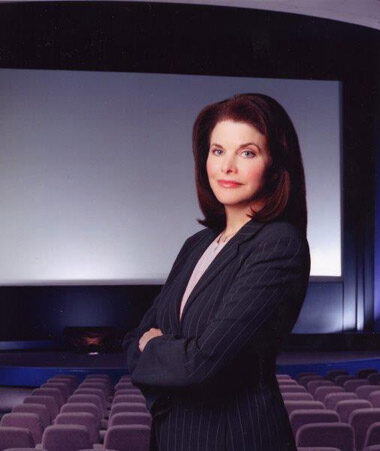Sherry Lansing
Class of 2004
- CEO The Sherry Lansing Foundation

Just be yourself because that is the best thing in the world.
Sherry Lansing was born in 1944 in Chicago, where her mother had settled in 1937 after escaping Nazi Germany at the age of 17. In Chicago, her mother found a job selling dresses, and her father invested in commercial real estate. Lansing had a stable, happy childhood until her father's sudden death when she was nine. Her mother took over the business, and Lansing was deeply impressed with her mother's "move forward" attitude.
Following her mother's example, Lansing learned to overcome her grief and enjoyed the escape that movies offered. She often produced plays for neighbors, assigning parts to her sister and friends. She dreamed of being a movie star and told her mother she wanted to be an actress. "When I shared this dream with my friends, they made fun of me," says Lansing, whose mother wanted her to focus on a future as a housewife and mother.
A dedicated student, Lansing was popular with her peers. When she was 12, her mother married a widower with two children. Lansing embraced her blended family, taking the last name of her new father. "I was blessed with my two fathers," she says. "I had a wonderful father, David, and a wonderful new father, Norton."
While attending Northwestern University, Lansing married a medical student, but that event did not keep her from excelling in her studies. She graduated cum laude with a triple major in math, English, and theater and with a minor in education. She and her husband moved to Los Angeles the day of her graduation. For the next four years, she taught English and math at an inner-city high school in East Los Angeles. At the same time, she pursued acting and modeling jobs.
Lansing did commercials for Max Factor, Alberto Culver, and Ivory soap. That exposure led to a 1970 role with George Segal in Loving and then with John Wayne in Rio Lobo. Just when her dream was becoming a reality, however, Lansing discovered she did not have a passion for acting. At the same time, her marriage was crumbling.
Hoping to make a new start, Lansing divorced and took a job as a script reader. "I gave up a lot of money to take this entry-level position," she says, "but it made me happy and I knew I was doing the right thing." She was soon promoted to head of the script-reading department at MGM Studios, and then she became MGM's vice president of creative affairs.
In 1977, she moved to Columbia Pictures, where she served as senior vice president of production. There, she put her stamp on films such as The China Syndrome and Kramer vs. Kramer, which took five Academy Awards including Best Picture. She reveled in her job, but her euphoria came to a halt one day when a car hit her while crossing the street. Her legs took the initial impact, but as she landed on the pavement, she fractured her skull. One leg was so badly injured that the emergency doctor considered amputating it. A specialist was able to save her leg, but Lansing had a slow, painful recovery.
Lansing returned to work with renewed determination to climb higher up the executive ladder. She hoped to be promoted to production president but was turned down because it was said a woman would never be able to get a man to report to her. In 1980, however, 20th Century Fox named her as its first female president of production. The New York Times announced her appointment on the front page with this headline: Ex-Model Becomes Head of 20th Century Fox.
"I was so disappointed in that headline," she says. "It negated 10 years of hard work and reeked of sexism." Under her guidance, Lansing's good taste and strong instincts guided her and her studio through a series of successes such as Chariots of Fire, True Verdict, and Taps, all box-office hits.
Lansing left Fox in 1983 and formed an independent producing partnership with Stanley Jaffe. Their 12-year union resulted in several hit movies. In 1987, her company produced Fatal Attraction, a script that had been turned down by 36 directors. Other movies from her company included The Accused, Black Rain, School Ties, and Indecent Proposal.
In 1991, Jaffe left to become president of Paramount Communications, and the following year he persuaded Lansing to run the studio. This time, the headline announcing her appointment was placed where she thought it should be, in the business section. "I finally felt recognized on the basis of my work and skills as a movie maker," says Lansing.
One of her first decisions at Paramount was to make Forrest Gump, which had been around for 10 years looking for a studio willing to produce it. The movie was a risky venture for Lansing, but once again her instincts proved to be correct. Other Paramount hits included popular franchises (Star Trek, Mission: Impossible, Indiana Jones, and the Jack Ryan/Tom Clancy series). During Lansing's tenure, Paramount had three Best Picture winners: Forrest Gump (1994), Braveheart (1995), and Titanic (1997).
Lansing left Paramount in 2004 and started the Sherry Lansing Foundation, which is dedicated to raising awareness and funds for cancer research.
